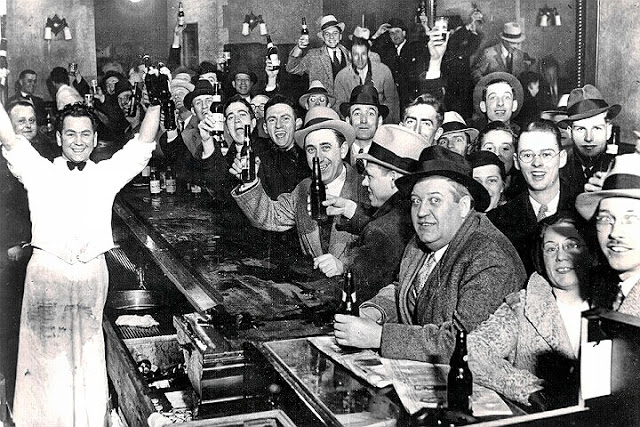December 5th, 1933, marks a pivotal moment in American history — the ratification of the 21st Amendment, which repealed the 18th Amendment, effectively ending the era of Prohibition in the United States. This landmark decision did more than simply legalize the manufacture and sale of alcohol; it reflected deep societal shifts and had lasting impacts on American culture and law enforcement. Let’s delve into the origins, consequences, and legacy of Prohibition and its repeal.
Origins of Prohibition
The roots of Prohibition stretch back to the early 19th century, influenced by the Temperance Movement. Spearheaded by organizations like the American Temperance Society, the movement gained momentum on moral, religious, and health grounds. Advocates argued that alcohol was responsible for societal ills, including crime, poverty, and the disintegration of family life.
By the early 20th century, these sentiments coalesced into a powerful political force, leading to the passage of the 18th Amendment in 1919, which prohibited the manufacture, sale, and transportation of intoxicating liquors.
Notable Figures of the Prohibition Era
In the complex tapestry of Prohibition, several key figures stand out for their influential roles:
- Wayne Wheeler: The driving force behind the Anti-Saloon League, Wheeler’s relentless advocacy was pivotal in the enactment of the 18th Amendment.
- Al Capone: The infamous gangster, Capone’s criminal empire, built on illegal alcohol, epitomized the unintended rise in organized crime during Prohibition.
- Carrie Nation: A fervent member of the temperance movement, Nation was notorious for her hatchet-wielding attacks on saloons, symbolizing the moral zeal behind Prohibition.
- Eliot Ness: As a Prohibition agent, Ness’s efforts, especially against Al Capone, highlighted the challenges and complexities of enforcing the Prohibition laws.
These individuals, among others, played critical roles in shaping the narrative of one of America’s most transformative and turbulent eras.
Consequences of Prohibition
Far from eliminating alcohol consumption, Prohibition inadvertently spurred a rise in criminal activities. The ban created a lucrative black market, leading to the rise of organized crime syndicates. Figures like Al Capone made fortunes through the illegal production and distribution of alcohol, while speakeasies (illegal bars) flourished nationwide.
Moreover, the enforcement of Prohibition put immense strain on the legal system, leading to corruption within law enforcement and the judiciary. The cost of enforcing the ban, coupled with the loss of tax revenue from alcohol sales, put a significant financial burden on the government, especially critical during the Great Depression.
Health and Societal Impacts
Ironically, Prohibition did not lead to improved public health or morals. The consumption of industrial alcohol, which was dangerous and sometimes lethal, surged. Additionally, Prohibition did little to curb alcoholism; instead, it pushed drinking into clandestine and often unsafe environments.
Why Prohibition was Repealed
The decision to repeal Prohibition was multifaceted. The financial strain of the Great Depression played a significant role. The potential tax revenue from legal alcohol was seen as a much-needed economic stimulant. Furthermore, the rise in organized crime and the apparent futility and counterproductivity of enforcement efforts swayed public opinion and political will.
The election of Franklin D. Roosevelt in 1932, who ran on a platform that included the repeal of Prohibition, was a turning point. The 21st Amendment was swiftly proposed and ratified, becoming the only instance in U.S. history where one constitutional amendment was entirely repealed by another.

The Historical Significance and Legacy
The repeal of Prohibition is not just a historical footnote; it symbolizes a dramatic shift in American societal values and government policy. It reflects a transition from moral and religious-driven legislation to a more pragmatic approach considering economic and social realities.
The end of Prohibition also brought about significant changes in American culture. It led to the regulated sale of alcohol, the emergence of modern bar and nightlife culture, and influenced American attitudes towards individual freedoms and government intervention in personal choices.
In a broader sense, the Prohibition era and its repeal offer crucial lessons about the complexities of legislating morality and the unintended consequences of such policies. It remains a compelling example of how societal norms and economic realities can shape, and reshape, American law and life.
As we look back on December 5th, 1933, we not only remember the re-legalization of alcohol but also acknowledge a moment that significantly altered the course of American societal and legal history.







Stanaland Edwin
October 14, 2024 / at 10:53 am
I enjoy all the reading.
Dori R. Benet
November 28, 2024 / at 7:25 pm
Prohibition taught us that : Forbidding alcohol only made it more attractive to the adult population. It was more sensible for the government to allow with control, conditions and regulations in place, that will hopefully, keep the population from eventually harming itself.
DRB
Paul Schreiner
November 29, 2024 / at 12:52 pm
Thank you. Short, pithy visits to the past are informative and enjoyable.
Thomas
February 7, 2025 / at 8:08 pm
Well done a reminder of the past